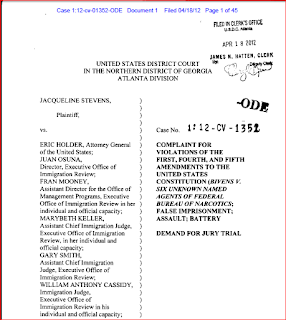On April 19, 2010 guards followed an unlawful order to remove me from the Atlanta federal building housing the immigration courts. Documents obtained under the Freedom of Information Act (FOIA) show that in the months following this, supervising employees of the Executive Office of Immigration Review (EOIR) and the Federal Protective Services (FPS) tried to cover up these events, in particular, to disguise the fact that the order to remove me while I was engaged in court observations for findings reported in The Nation magazine and scholarly publications came from the immigration judge William Cassidy, the same individual reported for the first time on this blog as having deported U.S. citizen Mark Lyttle.
On April 18, 2012, I filed a complaint in the United States District Court in the Northern District of Georgia, Atlanta Division charging violations of the First, Fourth, and Fifth Amendments to the United States Constitution (Bivens v. Six Unknown Named Agents of the Federal Bureau of Narcotics), and False Imprisonment, Assault, and Battery.
Summons were executed and immediately sent to the appropriate agencies for service on Defendants Eric Holder, Attorney General; Juan Osuna, Director, EOIR; Fran Mooney, Assistant Director for the Office of Management Programs, EOIR; MaryBeth Keller, Assistant Chief Immigration Judge, EOIR; Gary Smith, Assistant Chief Immigration Judge, EOIR; William Anthony Cassidy, Immigration Judge (EOIR); Cynthia Long, Atlanta Court Administrator, EOIR; Darren Eugene Summers, FPS; Inspector DOE, FPS; Paragon System, Inc. Guard DOES 1-4; and Paragon Systems, Inc.
The complaint relies on a contemporaneous transcript of a Paragon Security Systems, Inc. guard's call to the FPS Battle Creek Michigan MegaCenter, obtained pursuant to a FOIA request. That call, and 423 pages of e-mail to and from EOIR public affairs attorney Lauren Alder Reid, shows that the EOIR was closely monitoring my movements among immigration courts nationwide and had convened to discuss "banning" me from hearings following my reporting for articles in The Nation magazine that resulted in a 2011 Project Censored awards for number four out of the Top 25 Censored Stories in 2010.
In addition to detailing unlawful closures of hearings and cover-ups of this on two occasions by William Cassidy, Cynthia Long, MaryBeth Keller and Gary Smith, all EOIR employees, the complaint details numerous violations of judicial procedures for the purpose of highlighting the unlawful practices that the DOJ was attempting to hide.
According to the complaint:
125. On April 13, 2010, a desk clerk working at the immigration hearing rooms in the CCA facility at Lumpkin, Georgia sent the following message to court administrator Ray Bethune:The complaint states that the same absence of judicial conduct that harms respondents means that immigration judges may not claim the sovereign immunity from lawsuits available government officials who engage in truly judicial conduct.
"Subject: Problem...
Ray- That reporter woman is back and being argumentative about being allowed in the Courtroom. The courtroom is full! 97 detainees. We are suggesting that she wait until we do that mass removal and then allow her in. She refuses to take no for an answer. She is arguing with Sgt Perry also. Any suggestions on how to handle this?" (EOIR FOIA 2010-12055, p. 315, received January 9, 2012 in response to Plaintiff request of June 3, 2010)
126. "Mass removals" are not lawful under EOIR or any other DOJ procedures. According to the Immigration Judge (hereafter IJ) Benchbook: "[A]ll salient points discussed in the non-detainee setting must be covered in the detainee setting as well. In the detainee setting, it is important to get individualized answers from each respondent to important matters."
127. The windowless room in which the 97 people may or may not have heard their names called, and may or may not have heard and understood they were all being ordered removed, at all times relevant to this complaint had a seating capacity for approximately 24 people.
128. Plaintiff has been physically present in that room. Based on information and belief, the immigration judge running that hearing was J. Dan Pelletier. Based on information and belief, it would be impossible for Pelletier, reciting his script from a dais in an Atlanta court room and observing the Lumpkin hearing room via televideo, to have visually discerned individual respondents, much less engage each of them in any meaningful exchange.
129. Mass hearings of any sort are not consistent with judicial procedures.

No comments:
Post a Comment